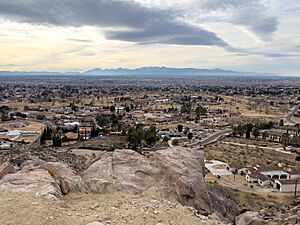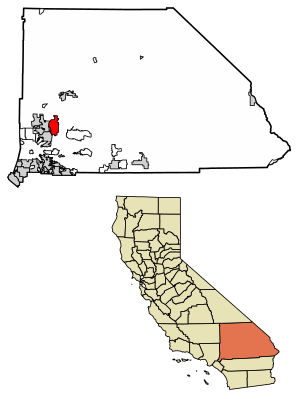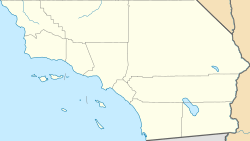Apple Valley, California facts for kids
Quick facts for kids
Apple Valley, California
|
|||
|---|---|---|---|

Apple Valley, California viewed from Bass Hill
|
|||
|
|||
| Nickname(s):
"Apple of the Desert"
|
|||
| Motto(s):
"A Better Way of Life"
|
|||

Location of Apple Valley in San Bernardino County, California
|
|||
| Country | United States | ||
| State | California | ||
| County | San Bernardino | ||
| Incorporated | November 28, 1988 | ||
| Named for | The apple orchards grown during the town's founding | ||
| Government | |||
| • Type | Council–manager | ||
| Area | |||
| • Total | 77.08 sq mi (199.63 km2) | ||
| • Land | 77.01 sq mi (199.44 km2) | ||
| • Water | 0.07 sq mi (0.18 km2) 0.45% | ||
| Elevation | 2,917 ft (889 m) | ||
| Population
(2020)
|
|||
| • Total | 75,791 | ||
| • Density | 984.22/sq mi (380.01/km2) | ||
| Time zone | UTC-8 (Pacific Time Zone) | ||
| • Summer (DST) | UTC-7 (PDT) | ||
| ZIP codes |
92307, 92308
|
||
| Area code | 442/760 | ||
| FIPS code | 06-02364 | ||
| GNIS feature ID | 2412372 | ||
Apple Valley is a town in San Bernardino County, California. It is located in an area called the Victor Valley. In 2020, about 75,791 people lived there.
The town is next to the cities of Victorville and Hesperia. It is about 35 miles (56 km) south of Barstow. Apple Valley was officially made a town on November 14, 1988. It is one of the few places in California that uses "town" in its name instead of "city."
Contents
History of Apple Valley
For many centuries, different Native American tribes lived in the Apple Valley area. These included the Shoshonean, Paiute, Vanyume, Chemehuevi, and Serrano peoples. They were drawn to the water and plants near the Mojave River. Later, the Mojave people arrived. They were the first tribal group met by Spanish explorers in 1542.
Early Explorers and Trails
In 1772, a Spanish explorer named Pedro Fages passed through the area. He was looking for soldiers who had left their posts. Father Francisco Garcés visited in 1776. He was friendly with the local tribes and even shared his food with them. Garcés helped create a trail across the Mojave Desert to the Colorado River. This trail went right through the Apple Valley area.
Later, in the 18th and 19th centuries, more Spanish explorers came looking for gold. Jedediah Smith created the Old Spanish Trail. This trail went through the southern Mojave Desert and the Cajon Pass. Smith was in the area in 1826 and 1827.
Throughout the 1800s, Apple Valley became a busy route for people traveling to Southern California. Even horse thieves, like Chief Walkara of the Ute tribe, used this area. They brought many horses from their raids on ranches.
Mormon Settlers and Railroads
In 1848, members of the Mormon Battalion came through. They were soldiers who had built the first wagon road across the southwest. They brought mules and the first wagon through the Cajon Pass. This was on their way to the Salt Lake Valley.
Later, in 1851, a leader named Jefferson Hunt guided a group of Latter-day Saints to the San Bernardino Valley. They also brought the first cattle from Southern California to feed people in Utah.
In 1885, a railroad line was built north through the Cajon Pass. A train stop was set up near the Mojave River. This stop was called Victor, which is now Victorville. John Brown helped build some of the first roads in Apple Valley. These roads allowed goods and stagecoaches to travel from mining camps to the railroad.
For many years, Victorville grew into a busy business center. It had gold refineries, quarries, and dance halls. Apple Valley, however, stayed more peaceful. It was known for its ranches and apple orchards.
The Apple Valley Name and Famous Orchards
The name "Apple Valley" became official when a post office opened in 1949.
One famous apple orchard belonged to Max Ihmsen. He was the publisher of a newspaper called the Los Angeles Examiner. In 1915, he grew apples and pears on 320 acres (1.3 km2) of land. His fruit won many awards, making Apple Valley well-known. In the late 1930s, his son-in-law, Cal Godshall, took over. He made the ranch famous as the place where college rodeo first started in California.
However, apple farming in the area began to slow down. Water costs went up, and World War I took many workers away. During the Great Depression, many families left to find work elsewhere. Apples from other states were cheaper because they could be shipped by river. Apple Valley apples had to travel by rail or truck. Also, bad weather and plant diseases in the mid-1940s caused commercial apple growing to stop.
A small apple orchard was kept at the Apple Valley Inn until it closed in 1986.
Roy Rogers and Dale Evans
Apple Valley was once home to famous western stars Roy Rogers and Dale Evans. Their museum first opened in Apple Valley in 1967. It later moved to Victorville in 1976, and then to Branson, Missouri, in 2003. The museum closed in 2009.
Geography of Apple Valley
Apple Valley is located at the southern edge of the Mojave Desert. It shares borders with Victorville to the west and Hesperia to the southwest. The town of Barstow is about 30 miles (48 km) to the north.
Apple Valley, along with Victorville, Hesperia, and Adelanto, is part of an area called the Victor Valley. The main road through Apple Valley is State Route 18. This road is known as "Happy Trails Highway" within the town. This name comes from the theme song of Roy Rogers and Dale Evans, who lived near this highway.
The Mojave River flows from south to north along the west side of Apple Valley. The southern part of the town is bordered by the foothills of the San Bernardino Mountains.
The town covers about 73.5 square miles (190 km2). Most of this area is land, with a small amount of water. Apple Valley is about 2,900 feet (880 m) above sea level.
Climate in Apple Valley
| Weather chart for Apple Valley, California | |||||||||||||||||||||||||||||||||||||||||||||||
|---|---|---|---|---|---|---|---|---|---|---|---|---|---|---|---|---|---|---|---|---|---|---|---|---|---|---|---|---|---|---|---|---|---|---|---|---|---|---|---|---|---|---|---|---|---|---|---|
| J | F | M | A | M | J | J | A | S | O | N | D | ||||||||||||||||||||||||||||||||||||
|
1.1
60
31
|
1.2
63
35
|
1.1
68
38
|
0.3
75
42
|
0.2
84
49
|
0.1
93
55
|
0.2
99
61
|
0.3
98
61
|
0.3
92
55
|
0.3
81
45
|
0.4
68
35
|
0.8
60
30
|
||||||||||||||||||||||||||||||||||||
| temperatures in °F precipitation totals in inches source: Weather.com / NWS |
|||||||||||||||||||||||||||||||||||||||||||||||
|
Metric conversion
|
|||||||||||||||||||||||||||||||||||||||||||||||
Apple Valley has a semiarid climate. This means it has cool winters and very hot, dry summers. Sometimes, strong winds blow in the spring and fall.
- July is usually the warmest month.
- The highest temperature ever recorded was 116°F (47°C) in 2002.
- December is usually the coolest month.
- The lowest temperature ever recorded was -1°F (-18°C) in 1949.
- February usually gets the most rain.
Population and People
| Historical population | |||
|---|---|---|---|
| Census | Pop. | %± | |
| 1970 | 6,702 | — | |
| 1980 | 14,305 | 113.4% | |
| 1990 | 46,079 | 222.1% | |
| 2000 | 54,239 | 17.7% | |
| 2010 | 69,135 | 27.5% | |
| 2020 | 75,791 | 9.6% | |
| U.S. Decennial Census | |||
2020 Census Information
According to the 2020 census, Apple Valley had a population of 75,791 people.
- About 54.7% of the people were White.
- About 38.2% were Hispanic or Latino.
- About 8.3% were Black or African American.
- About 3.4% were Asian.
- About 1.7% were Native American.
- About 0.4% were Native Hawaiian and Pacific Islander.
- About 15% of people were of two or more races.
About 16.7% of the people in Apple Valley lived below the poverty line. The average household income was $63,031.
There were about 25,928 homes in the town. Of these, 12,426 were lived in by families. The average family size was 3.7 people. About 65.5% of homes were owned by the people living in them.
The population included:
- 31.4% of people under 18 years old.
- 7.6% of people between 18 and 24 years old.
- 23.4% of people between 25 and 44 years old.
- 23.3% of people between 45 and 64 years old.
- 14.2% of people 65 years or older.
About 48% of the population was male, and 52% was female.
Economy
Apple Valley has many different types of jobs. The town's biggest employers include schools, hospitals, and large stores.
Major Employers in Apple Valley
Here are some of the largest employers in Apple Valley, based on a 2020 report:
| # | Employer | # of Employees |
|---|---|---|
| 1 | Apple Valley Unified School District | 1,574 |
| 2 | St. Mary Regional Medical Center | 1,301 |
| 3 | Walmart Distribution Center | 1,208 |
| 4 | Target Stores | 444 |
| 5 | Big Lots | 260 |
| 6 | Jess Ranch Healthcare | 181 |
| 7 | WinCo Foods | 176 |
| 8 | Walmart Stores | 152 |
| 9 | Stater Bros. Markets | 131 |
| 10 | Lowe's | 119 |
Education
The Apple Valley Unified School District runs several schools. These include high schools, schools for younger students (TK–8), and elementary schools (TK–6). There are also charter schools and private schools that offer classes from preschool to high school.
High Schools (Grades 9–12)
- Apple Valley High School
- Granite Hills High School
- High Desert Premier Academy
Middle Schools (Grades K–8)
- Mariana Academy
- Phoenix Academy
- Sandia Academy
- Sitting Bull Academy
- Vanguard Preparatory
Elementary Schools (Grades K–6)
- Desert Knolls Elementary
- Rancho Verde Elementary
- Rio Vista Elementary
- Sycamore Rocks Elementary
- Yucca Loma Elementary
Charter Schools
- Academy for Academic Excellence - also known as "Lewis Center for Educational Research" (Grades K–12)
Private Schools
- Apple Valley Christian Academy (Preschool–12)
Infrastructure
Cemeteries
The Sunset Hills Memorial Park and Mortuary opened in 1995. Famous people like Dale Evans and Roy Rogers are buried there.
Utilities
In 2016, the town council began the process of taking over the private water system. This means the town would manage the water supply for its residents.
Notable People from Apple Valley
Many interesting people have lived in or are from Apple Valley. Here are a few:
- Michelle Alozie, a professional soccer player.
- Pearl Bailey, a singer and actress, lived here with her husband, Louie Bellson.
- Earl W. Bascom, an inventor, artist, and rodeo legend.
- Chayce Beckham, a singer who won American Idol (season 19).
- Victor Buono, an actor.
- Billy Casper, a professional golfer.
- Cuba Gooding Jr., an Oscar-winning actor, went to Apple Valley High School.
- Dan Henderson, a mixed martial artist and Olympic wrestler.
- Roy Rogers and Dale Evans, famous western singers and actors, lived in Apple Valley for many years.
See also
 In Spanish: Apple Valley (California) para niños
In Spanish: Apple Valley (California) para niños
 | Charles R. Drew |
 | Benjamin Banneker |
 | Jane C. Wright |
 | Roger Arliner Young |






